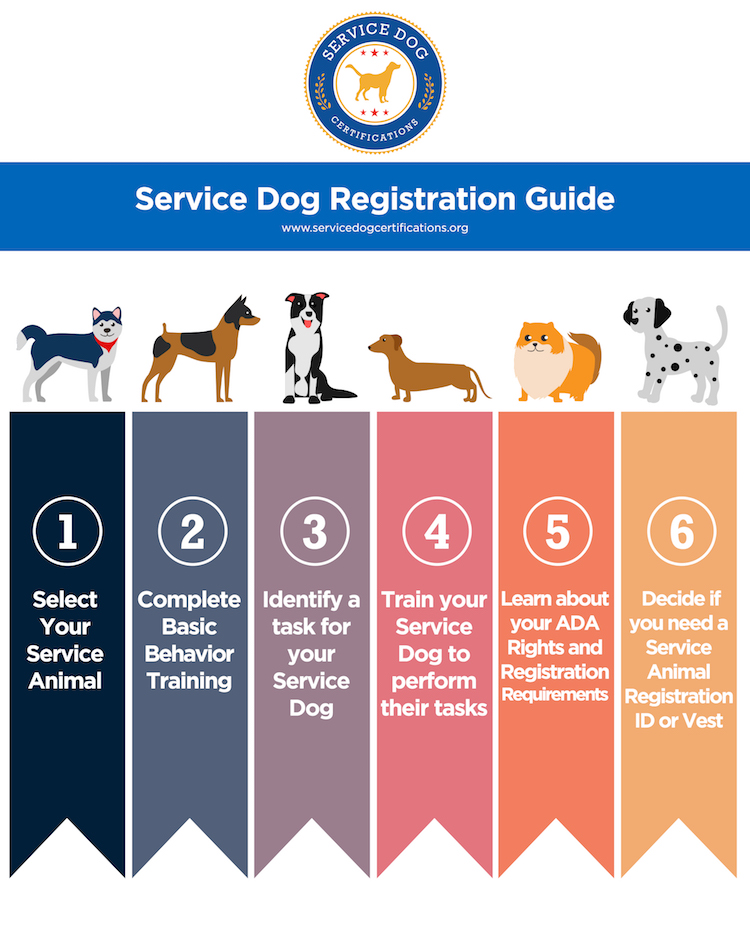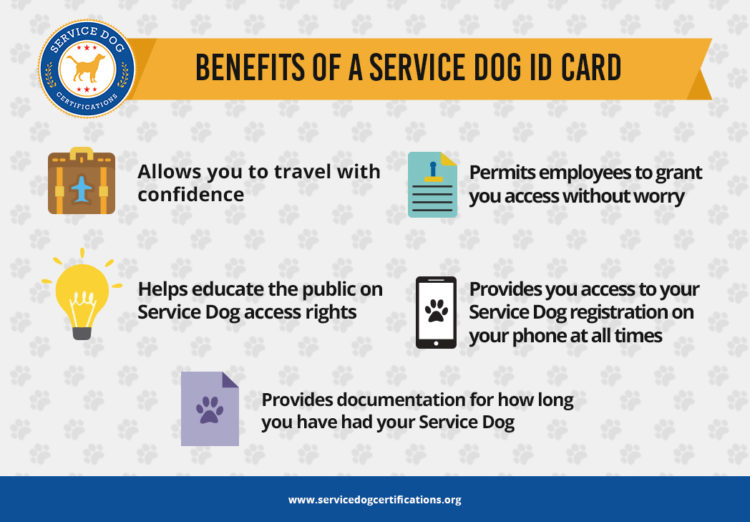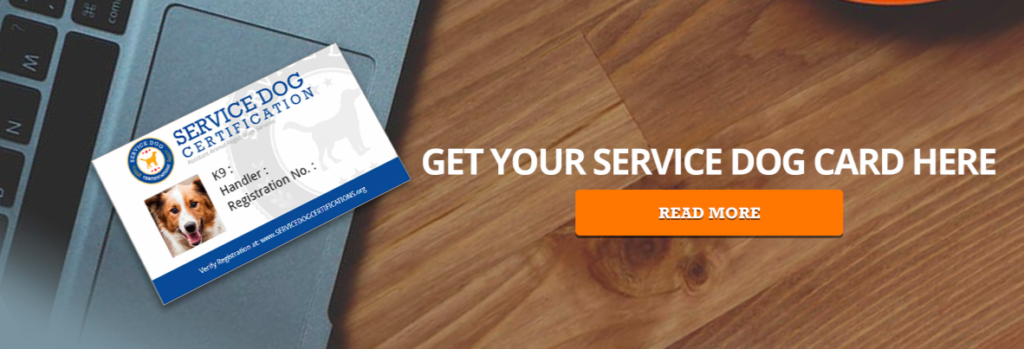Home Page › Blog › Can I Leave My Service Dog at Home?
Can I Leave My Service Dog at Home?

Service Dogs work to provide assistance to their owners both inside and outside the house. Many handlers like to keep them close by in case they need the help their Service Dog has been trained for. But, while there are no rules that a Service Dog must accompany their handlers 24/7, it is up to the individual to decide when they need their Service Animal close by. To understand what considerations that decision might involve, read on below.
Am I Allowed to Leave my Service Dog Alone at Home?
The Americans with Disabilities Act (ADA) has not specified any rules or regulations that state that a person must have their Service Dog with them at all times. If a handler feels as if they need their Service Dog with them whenever they leave the house, they are allowed to bring them along.
However, if the situation commends to leave their Service Dog at home, that’s okay. In fact, there may be circumstances where the handler may be unable to bring their Service Dog. In these cases, the handler will need to decide how to manage their symptoms in their animal’s absence. Remember, Service Dogs are to assist, not to burden.

A Person as a Substitute for a Service Dog
If a handler has to leave their Service Dog at home, but is not confident enough to encounter the situation alone, there are other ways that they can manage their symptoms. For example, the handler could be accompanied by a person who is aware of the individual’s needs. While the friend may not be able to detect an issue the way a Service Dog would, they would be able to support them while it happens and direct them to the proper supports. This gives the handler the opportunity to be without their Service Dog, but have support if need be.

When In Doubt, Stay with the Service Dog
In more serious cases, if a handler is unable to bring their Service Dog to a certain location, but can’t function without them, it’s recommended that they send somebody to go run the errand instead. The handler can stay in the presence of their Service Dog, while a friend can get the task completed for them.
Get a Service Dog ID for Confidence
Should a handler not feel confident enough to bring their Service Dog to specific locations, they may consider registering their Service Dog and purchase a Service Dog ID as well as a Service Dog vest. While it’s not a requirement, some individuals feel more confident bringing their Service Dogs along if it is visibly marked as a Service Animal.

The Handler must Decide
Ultimately, except in extreme cases, it’s up to the handler to decide whether or not they bring their Service Dog with them out and about. The Americans with Disabilities Act (ADA) ensures that the majority of public places allow Service Dogs. Nonetheless, every handler should have a plan in place for the case they run into a scenario where their Service Dog is unable to accompany them.
About the Author: The writing team at Service Dog Certifications is made up of folks who really know their stuff when it comes to disability laws and assistance animals. Many of our writers and editors have service dogs themselves and share insights from their own experiences. All of us have a passion for disability rights and animals.
12 comments
Leave a Reply Cancel reply
Latest Posts

How to Bring a Service Dog to Disneyland
Trained service dogs are more than welcome to join their handlers at Disneyland. In this guide, we’ll explain Disneyland’s policies and give practical advice for bringing a service dog to Disneyland for the first time. Disneyland’s Service Dog Policies The Magic Kingdom is happy to welcome trained service dogs across most park locations! They kindly […]

Read More

Can Dogs Eat Tomatoes?
Yes! Dogs can safely enjoy tomatoes, but there are a few risks to be aware of so you can feed your dog responsibly. Fully ripe tomatoes (without the stems and leaves) can actually have nutrients that are good for your pup. Tomatoes have chlorogenic acid, an antioxidant that can have anti-inflammatory effects in cells. They’re […]

Read More

Can a Primary Care Doctor Write an ESA Letter?
Your family doctor, also called a primary care physician (PCP), can write a letter recommending an emotional support animal. We’ll explain what legally gives them that ability and explore what better options might be available for you. Why are Physicians Able to Write an ESA Letter? To turn your pet into an emotional support animal, […]

Read More








There is NO such thing a registry for an SA!!!
People are falling for these fake scams online to buy a kit.
The ONLY proof you can have at will is a certificate or completion of the training the SA has done at a recognized facility.
Otherwise, all these kits are bogus and you should be ashamed of yourself for tricking in people to buy an SA kit.
The ones that buy these are 99% not in need of an SA and only want to bring their pet with them all over the place.
That is inaccurate – as we consistently point out, you do not need ANY certificate or any other form of documentation to prove that you have a service dog. Under the ADA, third parties can only ask two questions: 1. Is the dog a service dog required for a disability? and 2. What work or task has the dog been trained to perform? Registrations, certificates, ID cards, vests, tags, etc. are useful for service dog owners, but never mandatory. Please see this post for more details: https://www.servicedogcertifications.org/how-to-register-service-dog/
The mere name “Service Dog Certifications” is a lie. Definition of certification: designated credentials earned by an individual to verify their legitimacy and competence to perform a job–the formal attestation or confirmation of certain characteristics of an object, person, or organization–you can do NONE of the above…
A certificate is: a document containing a certified statement especially as to the truth of something. specifically : a document certifying that one has fulfilled the requirements of and may practice in a field. 2. : something serving the same end as a certificate
We note your concern but we think you have not taken a closer look at what we do. We publish more content than any organization specifically educating the public on this issue – that you never need a certificate for a service dog. Because there are no certifying organizations for service dogs, the certificates we offer are self-certifying. ADA rules require the handler, not an organization, to make representations about their dogs. We offer service dog accessories to owners because they find them useful in everyday life, but continually remind them that third parties can’t make them a requirement.
A service animal and it’s job to serve the patient, is an important one! As a former Government Law Enforcement Officer of one quarter of a century; I’ve worked with service K-9 Dogs, and trained different types of service Dogs and assisted in Training Dogs in SAR response teams and Medical assist teams tracking down lost individuals who have medical conditions of several different types in different echo systems in almost every environment.
Regarding the different types of circumstances that ADA attempts to cover that hasn’t be mentioned in the “What if “senecio’s”, that I have seen turn into extreme issues in the past is as follows. One of these is not just leaving your service Dog at home but; Leaving you’re service Dog in a hotel room you have purchased for a short period of time. Whereat such time, upon the patients decision to leave the service Dog behind; shortly thereafter, the service Dog becomes Naturally upset and nationally worried without the patient presence! At such time, the animal begins to Bark, Wynn, scrap and scratch at the door: All due to the Dogs training! This is a response to being unable to see the Patient on a continues basis and their well-being of said patient!
These actions and decisions on behalf of the patient; leaves the Hotel staff in a dilemma! When all the other paying customers start calling in complaints regarding a disturbance of their Peace! Then a situation becomes the realization of reality! Does this patient really need a service Dog? Is this decision to leave a service Dog in a dwelling, temporally used by the patient considered a Quote “Left at Home service Dog”, are there rules regarding such decisions in such situations that have lead to opening investigation on the disabled patient by ADA regarding the validity of the patients case? Not to mention in the case of local police being called due to concerns by the Hotel staff and it’s occupants, that the patient is possibly in the room unconscious or hurt in some way and the actions of the service Dog is really a form of alerting others to the patients situation?
These types of events have actually happened! Reports have been written, and have found there way to Social Security Agents; whereat such time, the individual patient, who actually needs their Medicare & Medicaid and their service Dogs; lost all of Benefits at once: winding them up on the streets homeless without medical, nor a service Dog, as well as a pay check never to be seen again! All over a bad decision!
I believe a logical set of rules on what you can and cannot do with a living service Dog should be at least considered, Of course doing so in such a way that allows the patient to understand the risks and possible circumstances ie outcomes regarding not Just this one issue but the several that can and has actually occurred that I’ve witnessed! Your Disability is important to everyone! Not just you! Everyone should be concerned about individuals with disabilities because it’s for all of us! Anyone at anytime can suddenly be in need of this benefit that WE all as individuals have put our hard earned money into!?! With that said, it’s all of our responsibility to treat these benefits with good decisions In a honest nature and equal way.
James.
I have a Hearing Alert Service Dog and am having issues with the apartment village that I’ve just moved into limiting service dogs to only being left alone for one hour. That doesn’t get me to the doctors or physical therapy without him even though he has been trained to be alone while for up to 4 hrs while I worked part time and more importantly not needed to be there for my benefit or anyone else’s..
They are ignorant to the knowledge that his primary work for me is at home and anytime I am alone such as walking in the woods somewhere I’m unfamiliar with or I at large events or when I feel necessary.. I’m learning that people who can hear just don’t have a clue to what life is like. I’ve had nerve deafness rendering me partially deaf for over 35 yrs. And currently losing hearing in my other ear. Becoming a widow and moving to an unfamiliar place is eye opening to how much I relayed on my husband and family to hear and just know what’s happening around me. I feel safer sleeping at night knowing I’ll know if someone’s at the door before they come walking in!
Not all Service Dogs are needed 24/7 That doesn’t make any one disability for the service the animals provide any less or more valuable.
Thank you for sharing your experience.
I am hearing impaired. I wear hearing aids and at the suggestion of my Audiologist, I have a service dog. My dog is very important to me when I am alone and especially at night because without my aids, I am deaf. My husband and I went on vacation to Myrtle Beach and we were told that we could not leave the dog in the hotel room when we went out to dinner. My service dog is very important to me but I do not need her assistance all the time and my husband was with me. Can the hotel have these policies? This was a pet friendly hotel.
Service dog owners are typically allowed to leave their dogs for short periods of time during periods where their service is not needed.
What’s the point of having a service animal just to leave it at home? How can it “work” for their handler if they are separated? Why have a SD then?
Sometimes service dog owners need to leave their animals at home. For example, the owner may be having a procedure at a hospital and could leave the animal in the care of someone else. Or, the owner may just be leaving the house for a brief period where they anticipate their animal will not be needed during that time.
If you become a patient in a hospital, especially a psychiatric hospital, you may need to make arrangements for your service animal to be cared for by someone. As a patient, you will not be able to provide care for your service animal. And a locked facility for mental health, has to guarantee the safety of all patients, which can put your animal at risk of injury or injury to others. So please, think about your animal in cases of emergency admissions and have a plan.